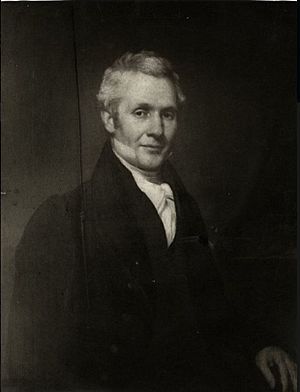George Strother Gaines facts for kids
Quick facts for kids
George Strother Gaines
|
|
|---|---|
 |
|
| Born | May 1, 1784 |
| Died | January 21, 1873 (aged 88) State Line, Mississippi
|
| Resting place | Peachwood Cemetery, State Line, Mississippi |
| Occupation | Alabama State Senator, Choctaw Indian agent, banker |
| Relatives | Edmund P. Gaines, brother |
George Strother Gaines (born May 1, 1784 – died January 21, 1873) was an important person in the early history of the American South. He worked for the United States government as an agent who dealt with Native American tribes, especially the Choctaw people. He also helped move the Choctaw to new lands in the 1830s. Later, he became a banker and a state senator. His work helped shape the states of Alabama and Mississippi.
Contents
Early Life and Family
George Strother Gaines was born in North Carolina on May 1, 1784. He was the eleventh of thirteen children. His parents were Captain James Gaines and Elizabeth Strother Gaines. His father fought in the American Revolutionary War. Both of his parents came from well-known families in Virginia.
George's older brother was Edmund Pendleton Gaines. A city in Florida, Gainesville, is named after him. Edmund became a major general in the U.S. Army. Soon after George was born, his family moved to Gallatin, Tennessee.
Working with Native Americans
In 1804, George Gaines started working for the government. He became an assistant "Indian factor" at the Choctaw Trading House. This trading post was in St. Stephens, which was part of the Mississippi Territory at the time. Today, St. Stephens is in Alabama.
Indian factors were government agents. They managed trade with Native American tribes. They also served as important contacts between the government and the tribes. The St. Stephens trading post was a small town located on the Tombigbee River.
Becoming a Chief Factor
In 1806, the main Indian factor, Joseph Chambers, left his job. George Gaines took his place. In this new role, Gaines earned the respect of both Native Americans and settlers.
As more settlers moved onto Choctaw land, tensions grew. People competed for natural resources like land and water. Gaines was able to keep things calm in the area during this time.
The Creek War
In 1813, a group of Creek Indians attacked Fort Mims. This event is known as the Fort Mims massacre. After this, Gaines convinced the Choctaw and Chickasaw tribes to help defend the lower Tombigbee River valley. He gave supplies to Choctaw volunteers. These volunteers fought against the Creek during the Creek War (1813-1814). This war happened at the same time as the War of 1812, which involved the U.S. and Great Britain.
Later Career and Influence
In 1818, Gaines left his job at the Choctaw Trading House. He joined the Tombeckbee Bank in St. Stephens. By then, St. Stephens was the temporary capital of the new Alabama Territory.
However, the bank faced money problems. This was made worse by a financial crisis called the Panic of 1819. Because of these difficulties, Gaines had to leave the bank in 1822. He then moved to Demopolis, Alabama. There, he bought the Choctaw Trading House from the government and continued trading with the Choctaw people.
Public Service and Banking
Gaines served as a member of the Alabama State Senate from 1825 to 1827. He also became the president of the Mobile branch bank in Mobile, Alabama. He held this position from 1833 to 1846.
The Treaty of Dancing Rabbit Creek
George Gaines played a key role in the Treaty of Dancing Rabbit Creek. This agreement was made between the United States and the Choctaw people. Through this treaty, the U.S. gained most of the Choctaw lands in Alabama and Mississippi.
The Choctaw tribe asked Gaines to explore new lands for them. These lands were in what was called Indian Territory. Today, this area is part of Oklahoma. Gaines led an expedition to scout these lands before the Choctaw reluctantly agreed to move there.
Gaines was criticized by some for spending too much money on moving the Choctaw. However, many historians believe he handled the move in a more humane way compared to how other tribes, like the Cherokee, were forced to move.
George Strother Gaines passed away on January 21, 1873. He is buried in State Line, Mississippi.
See also
- Gainestown, Alabama, a community named in his honor. It was founded where one of his old trading posts used to be.
- Edmund P. Gaines, his brother.

